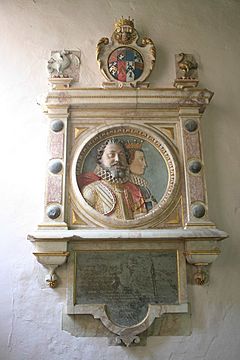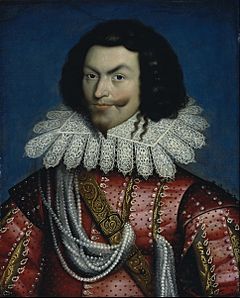Francis Barrington facts for kids
Quick facts for kids
Sir
Francis Barrington
|
|
|---|---|
| Member of Parliament for Essex |
|
| In office December 1620 – July 1628 |
|
| Deputy Lord Lieutenant of Essex | |
| In office 1603–1626 |
|
| Personal details | |
| Born | 1560 Barrington Hall, Essex |
| Died | 3 July 1628 (aged 68) London |
| Resting place | St Mary the Virgin, Hatfield Broad Oak |
| Nationality | English |
| Spouse | Joan Cromwell (1579-his death) |
| Children | Thomas (c.1585-1644), Robert (?-1642), Francis, John (?-1631), Elizabeth |
| Alma mater | Trinity College, Cambridge |
| Occupation | Landowner, politician and Puritan activist |
Sir Francis Barrington, 1st Baronet (born around 1560, died July 3, 1628) was an important English politician and a Puritan leader. He was a Member of Parliament (MP) for Essex for many years, from 1601 to 1604, and again from 1620 to 1628.
As one of the richest landowners in Essex, Sir Francis Barrington strongly believed in changing the Church of England. He had many family members who were also Puritans, which gave him a lot of power in Parliament. He often disagreed with the kings, James I and Charles I, especially about their religious and foreign policies.
In 1626, he was put in prison because he refused to help collect a special tax called the "Forced Loan." King Charles I tried to collect this tax without Parliament's approval, which was a big deal at the time. Sir Francis was released in January 1628 because he was very sick, and he passed away on July 3 of that year. Many people admired him for standing up to the king. Even 40 years after his death, he was remembered as a great leader.
Contents
Who Was Sir Francis Barrington?
Sir Francis Barrington was born in 1560. He was the oldest son of Sir Thomas Barrington and Winifred Pole. His father was a strong Puritan, and Sir Francis followed in his footsteps. The family had important connections, including relatives linked to the Calvinist Earl of Huntingdon.
Family Connections and Influence
In 1579, Sir Francis married Joan Cromwell. She was the aunt of two future important Parliament leaders, Oliver Cromwell and John Hampden. This shows how closely connected the Puritan families were.
Sir Francis and Joan had nine children who lived to adulthood. Four of them were sons: Thomas, Robert, Francis, and John. John died while fighting in the Eighty Years War in the Netherlands. Three of their daughters married important men who also became Members of Parliament. These family ties made Sir Francis Barrington a central figure in a powerful political group.
Sir Francis Barrington's Career
Sir Francis Barrington finished his studies at Trinity College, Cambridge in 1580. After that, he traveled to Geneva, a city known as the birthplace of John Calvin, a key figure in the Puritan movement. He returned home in 1581 and became very active in local government.

Early Political Life
In 1601, Sir Francis was first elected as an MP for Essex. The next year, he inherited a lot of land from his mother in different parts of England, which further increased his political power.
When Queen Elizabeth I died in 1603, the new king, James I, invited Sir Francis to meet him. King James I later made Sir Francis a knight. In 1604, Sir Francis was re-elected as an MP for Essex with the help of Robert Rich, 1st Earl of Warwick. Sir Robert Rich was also a strong Puritan, and their families formed a political alliance that lasted for many years. Sir Francis also became the Deputy Lord Lieutenant of Essex in 1603.
Working in Parliament
Sir Francis Barrington created a report for Parliament about church leaders in Essex who he felt were not following Puritan beliefs. He was also part of many committees that worked on rules for the Church of England. Even though he didn't speak much in Parliament, he was chosen for so many committees that he couldn't attend them all!
In 1607, he was removed from his local role as a JP because he opposed King James I's plan to unite England and Scotland. However, he was given his JP role back in 1610. In 1611, he bought a special title called a baronetcy for £1,095.
Growing Influence and Opposition to the King
Sir Francis used his wealth and family connections to gain more land and political power. In 1612, he bought Hatfield Manor and started building his home, Barrington Hall. After Sir Robert Rich died in 1619, Sir Francis became the most important political figure in Essex. He was elected to Parliament again in 1621 and 1624. He strongly supported appointing Puritan church leaders and was friends with important religious figures like James Ussher, who led the Church of Ireland.
Many English people, including Sir Francis's son John, were worried about King James I's friendly policy towards Spain. They wanted the king to support his son-in-law, Frederick V of the Palatinate, in the Thirty Years War.
When King James I died in 1625, his son Charles I became king. Charles I called a new Parliament in April. As an MP for Essex, Sir Francis supported the Duke of Buckingham, who wanted to declare war on Spain. However, this Parliament also saw the beginning of big arguments over taxes, like Ship Money, which eventually led to the First English Civil War in 1642.

Conflict with King Charles I
Normally, Parliament would approve customs duties (taxes on goods) for a king's entire reign. But Parliament now wanted to approve these taxes every year, to have more control over the king's policies. King Charles I did not like this and dissolved Parliament in August. He then tried to gain support by declaring war on Spain in September. This war, led by the Duke of Buckingham, was a disaster.
When Parliament met again in 1626 to approve new taxes, they insisted that the Duke of Buckingham be removed from his position first. King Charles I refused and dissolved Parliament again in June. Because Sir Francis Barrington was seen as an opponent of the king, he lost his role as Deputy Lieutenant of Essex and his position as a Justice of the Peace.
Since he couldn't get money from Parliament, King Charles I created a "Forced Loan" in September to pay for his foreign policy. Sir Francis Barrington was ordered to collect this loan in Essex, which meant he would be responsible for the full amount. When he refused, he was arrested and held in Marshalsea prison, along with his wife and daughter Ruth. His health quickly worsened, and he was released in January 1628.
Sir Francis Barrington was seen as a hero for standing up against the Forced Loan. He was re-elected to Parliament in March 1628, but he died on July 3. His son Thomas took over his title. Sir Francis was buried at the church of St Mary the Virgin in Hatfield Broad Oak.
Images for kids
-
A monument to Robert Rich, 1st Earl of Warwick, a Puritan leader whose ideas Sir Francis Barrington supported.
-
The Duke of Buckingham. Sir Francis Barrington supported his plan for war against Spain but later wanted him removed from power.
 | George Robert Carruthers |
 | Patricia Bath |
 | Jan Ernst Matzeliger |
 | Alexander Miles |



